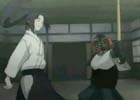Peace Maker Kurogane
| Also Known As: PMK | ||
| Genre: Comedy/Action | ||
| Format: 24 Episodes | ||
| Allegiance: Gonzo | ||
| Director: Hirata Tomohiro | ||
| Vintage: 2003-2004 | ||
| Intelligence Agency Report by: Djudge | ||
| The flames of revolution hit Ichimura Tetsunosuke hard when he saw his parents massacred by a Choushuu assassin on a cold winter day. In order to gain the vengeance he so desperately seeks, Tetsu joins his older brother Tatsunosuke in enlisting with the famed Shinsengumi of Kyoto. However, the road to power is not an easy one, as Tetsu soon finds out. In order to become a part of the troop, Tetsu not only has to overcome the fears and doubts of his troubled past, but he also has to throw away his humanity and become a demon on the battlefield. | ||
|
|
||
| Field Agent Report by: Djudge | ||
| Plot Characters Impact Visual Audio |
7.00 8.00 7.25 7.75 8.00 |
|
| Overall | 7.50 | |
| (not an average) | ||
In the wake of Rurouni Kenshin’s (hopefully) final saga in the Seisouhen OVA’s, many anime fans have been eagerly awaiting the next big title in the samurai action genre. The announcement that Kurono Nanae’s Shinsengumi manga, Peace Maker Kurogane, was being animated by the talents of Gonzo recently rekindled those hopes of the appearance of a worthy successor to Kenshin. However, despite all the hype surrounding Peace Maker Kurogane, when it all boils down the dizzying shifts between comedy and drama severely hampered the effectiveness of both in the long run.
As I stated earlier, the animation was left in the very capable hands of Gonzo, the masterminds behind such titles as Hellsing, Last Exile, and the upcoming movie Spirit. So needless to say, I was expecting high quality and well-coordinated animation out of this piece especially since this piece had a focus on the exploits of the Shinsengumi. However, as time wore on, I began to see a trend in that the animation would be nothing too impressive. Most of the highlights in the artwork came from the super-deformed character designs that Hayashi Akemi sketched out for the comedic segments of Kurono’s original plot. When the series finally sported some action segments, I found that the mediocrity of less intense scenes left their mark there as well. The production values visibly increased for more serious and plot-centric episodes, but did not show off their muscle until the last few climactic episodes. In sum, I found the visual performance by Gonzo in this piece to be a bit disappointing. The music also follows the same suit: there’s pretty much nothing to write home about, with the possible exception of the opening and closing themes, and even that’s a long shot. At least the seiyuu work in this title didn’t fall apart. Strong performances, especially for the Shinsengumi captains, worked to great effect in fleshing out each of the characters’ personalities and made for quite the diverse and unique cast.
The actual substance of Peace Maker Kurogane doesn’t fare that much better either. The individual characters a blast to watch on screen. The various relationships held between them range from absolute despotism to tight-knit comradery, and they are all used to good effect in the comedic light of this series. However, when the times come for the series to shift to a darker focus, sometimes within the span of a single episode, I found the earlier gags still conflicting with the current material. Then just as I get myself situated with the dynamic focus shift the series returns back to being a lighthearted comedy. This was an extremely frustrating aspect of the show that maimed the emotional gravity of the final episodes leading up to Peace Maker Kurogane conclusion surrounding the events of the famous raid on the Ikeda-ya. The pains of loss and emotional instability work so much better in a story if it isn’t surrounded, and sometimes permeated, by fresh hints of prank and situational comedy. On a last note, this series also tends to deviate into the occult early on, leaving us to watch the Shinsengumi fend off zombies, wraiths, and mystical death traps. The inclusion of these elements is definitely a turn off for those seeking complete historical accuracy.
Through and through, Peace Maker Kurogane failed to live up to my aspirations of viewing a second Rurouni Kenshin. However, the series isn’t completely without its merits. The series showcases some fairly hilarious segments with the episode dedicated to Hijikata’s haiku book nearly becoming the single best highlight of the title. However, if you want to watch the Shinsengumi in a serious setting, this show only half succeeds. The drama and plot don’t really pick up until the last twelve or so episodes, so if you can bear with the static focus of Peace Maker Kurogane until then, more power to you. As for the rest of us, the search is still on for the next great samurai anime.




